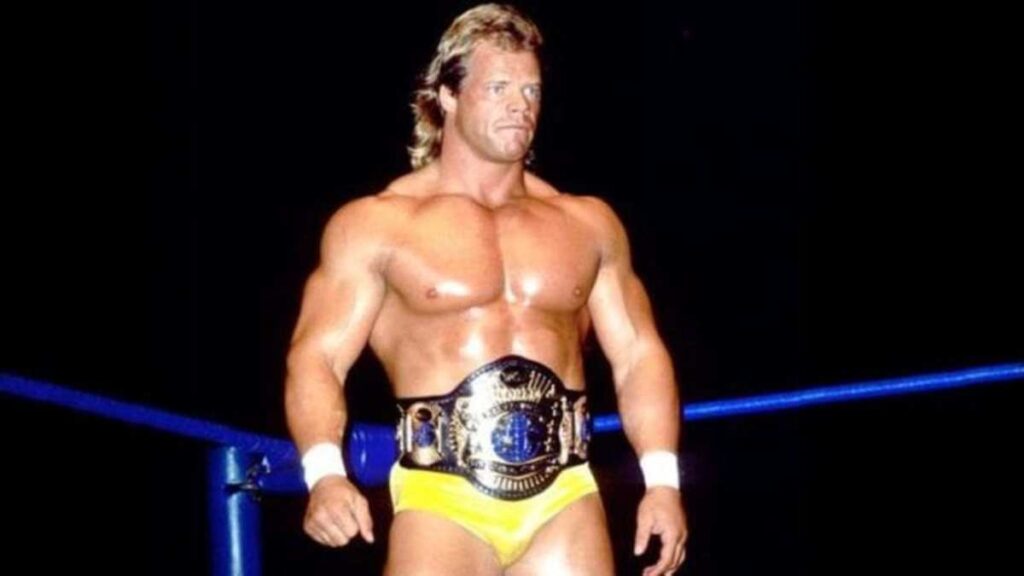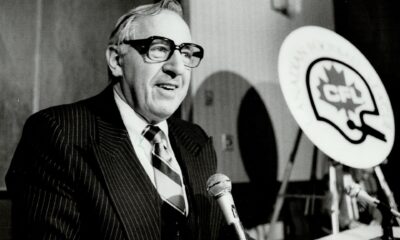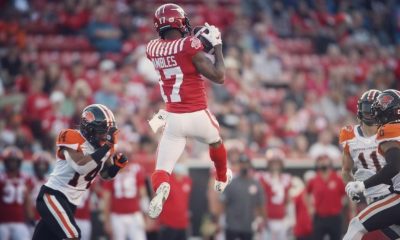
It’s no secret at all the many pro wrestlers started out as football players. Roman Reigns, Dwayne Johnson, Steve Austin, Mongo McMichael, John Layfield, Bill Goldberg, Ron Simmons, and that list goes on and on. Of course one name not to forget is the legendary and iconic Lex Luger.
Not only did he go on to become one of the greatest professional wrestlers the industry has ever seen, but he had one heck of a pro football career and especially a great run in the CFL with none other than the Montreal Alouettes.
Luger, whose real name is Lawrence Pfohl, was born in Buffalo, New York in 1958 and he received a football scholarship to Pennsylvania State University. Luger would end up leaving the university when the coaching staff suggested that he would be better suited as a defensive end or linebacker. Luger was an offensive lineman of course.
Well, he would eventually make it to the Miami Hurricanes, but ultimately that road would lead him to playing some pro football, but in Canada of all places…in the CFL, and for a team that’s near and dear to this writer’s heart for obvious reasons…the Montreal Alouettes.
He was with the Als from 1979 through to 1981…his crowning achievement would come as he played in the 67th Grey Cup, his first year with the team. The game was held in Montreal and at the infamous Olympic Stadium against the Edmonton Eskimos. Sadly Montreal would ultimately lose the game 17 to 9.
But, his legacy in Montreal would be set and although I wasn’t yet born, the moment has lived on in our city and both the game, that year’s lineup, and Lex himself will always be held in high regard and it is an epic moment and great example of some of the rich history in Montreal sports.
The work he put in during his time in the CFL would eventually get Luger signed to the Green Bay Packers of the NFL, but sadly he would be sidelined with injury for most of his time there and he didn’t get to play with the legendary NFL team. He has said this of his opportunity with the Packers:
“I would have loved to have had a long-term career with the Packers; are you kidding me? …If I did, I probably wouldn’t have become a wrestler. So, in the big picture, it worked out for me in that regard … Had it worked out in Green Bay, I seriously doubt I would have become a pro wrestler.”
-via Green Bay Press-Gazette (Wikipedia-transcription)

-image via Rick J on Twitter
His career would finish in the USFL, where he played for various teams in the first incarnation of that league…the Jacksonville Bulls, the Tampa Bay Bandits and the Memphis Showboats. But just when one door was closing, another door opened.
Physically gifted, Luger was made for the world of professional wrestling—especially in the eighties, when perfect bodies sold a lot of tickets, and Luger had the perfect physical attributes to make him a top star.
He studied under Hiro Matsuda who had trained the iconic Hulk Hogan (interestingly enough, Matsuda had once broken Hogan’s leg in training to dissuade him from pursuing a wrestling career, but Hogan’s coming back for more ingratiated him to the legendary Japanese wrestler).
For Luger, this would be in 1985 that he would start his training. Thus his studies in the sport of pro wrestling began, and he would make his debut in that realm that same year. The CWF was where he started to compete and would end up at Jim Crockett Promotions’ WCW…which of course was under the governing body that was the NWA.

-image via Wrestling News
All of this would lead to many epic and historic storylines and of course championship gold. Luger’s early days are indeed legendary amongst pro wrestling fans, but his career wouldn’t stop there, as he had yet to work for what was then starting to be known as the biggest show in town, the WWF (WWE).
It would be in 1992 that Luger would sign on with Vince McMahon’s World Bodybuilding Federation (now defunct), as co-host to their program, but perhaps it would be his debut in a pro wrestling ring under the WWF banner that made the most amount of noise. That debut would come in 1993.
His run in WWF was probably one of the most iconic of the early to mid-nineties. With Hulk Hogan departing the company for WCW, the company was in need of a top draw and one that would attract the same type of audience that Hogan had.
Well, it worked for as long as it was destined to, and Luger, despite what the company may say now, did his job to the best of his ability, and fans were drawn to him and his star quality for sure.
Memorable moments included battling the mighty Yokozuna and of course teaming with the late, great Davey Boy Smith…the Allied Powers was a team that any 8 to 12 year-old-boy could certainly get on board with and I was in that demographic and I ate it up for sure.
But 1995 would bring yet another change of direction for the legend…he would decide to go to WCW and was one of the first shots fired in what would become the Monday Night Wars between WWF and WCW…something pro wrestling fans are quite fond of…a period that changed the game and changed it forever.
But in the end, this is a piece about football, and rare is it that a man can become legendary in one thing, but Lex Luger indeed became a legend in two sports, and really in the end, that’s reason enough to put the man on a pedestal. After all, isn’t that what sports are all about…putting our winners where we can praise and admire them?
Well so then enter Lex Luger…an icon, a winner, and a man that gave us all many reasons to cheer and root him on, and in two completely separate industries to boot.
NEXT: Riders Sign Australian, Ryan Meskell—Rider Nation Looking Forward To Taking On Bombers With Newfound Confidence
*For all of your CFL News, Rumors and Insights: CFL News HUB
Continue the CFL Football discussions on our offical CFL Discord Channel

Big Announcement: CFL Unveils Free Live Streaming Platforms
Get Alerts & Stay Connected
CFL iPhone AppCFL Android App



















